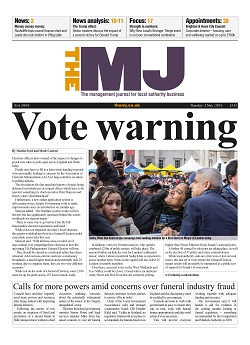Why does local public audit matter? Why should citizens care about this dry and dusty corner of our system of governance? What has local public audit ever done for us?
Three good questions. At the heart of my answer is trust.
Without trust in local bodies there are real risks to their ability to serve their communities. For more than 150 years local public audit has helped create, build, and maintain trust in local public bodies. The existence of an independent local auditor with a wider brief than just the accounts fostered an environment where good governance, robust decision making, and transparency became norms rather than aberrations. All that is now at risk.
I have spent almost my entire career in public audit. I have been extraordinarily lucky in working with some outstanding public servants from the parish clerks in Wiltshire – where I grew up – to permanent secretaries. It is hard to imagine what other career in audit would have led from my mother’s council house to the Palace of Westminster. But that is where I found myself recently, giving evidence alongside the comptroller and auditor general (C&AG) to the Levelling Up, Housing and Communities Select Committee.
As I trained, I benefitted from learning my trade in an organisation devoted to the practice of public audit. I was and remain proud to have been a district auditor. It is hardly surprising I share the C&AG’s view of the importance of local public audit to the health of our democracy.
Alas, England’s system of local public audit is close to breaking. The situation in local government audit is especially worrying. Having a backlog of 1,000 local government accounts’ audits (more than double the annual number) by the autumn of this year would be a historic and wholly unwelcome record. Its causes are complex but reflect in part the wider challenges the audit profession faces. Regulatory demands mean auditors ask more of accounts preparers and need greater support from experts on areas such as pensions and asset valuations. The Financial Reporting Council’s first ever financial sanction of a local public audit in January 2022 has also driven auditor behaviour.
Effective local public audit has always had a focus not just on what has happened in the past (the accounts) but also on the here and now (public reporting and recommendation making). These areas of the audit speak directly to the interests of taxpayers and service users. It obviously damages public trust if the effectiveness of work on these areas is compromised simply because of the scale of the backlog.
Timeliness is key to effective audit for both financial statements and the other areas of the auditor’s responsibilities. A technically perfect audit that is three years late is of little use, yet this is increasingly where the system seems to be heading by drift rather than design.
The local audit backlog is bad enough, but its effects are no longer containable. The whole of government accounts, which are hugely important for Parliamentarians scrutinising government, is falling ever further behind partly driven by delays in local audit. Government bodies including the Ministry of Justice have their audits delayed because the audits of local government pension schemes are now late. And the audit of local NHS bodies is also now showing strain with implications for the audit of the Department for Health and Social Care.
What needs to change? First and foremost, the backlog needs to be reduced quickly. All organisations involved must play their full part in supporting the Financial Reporting Council as the shadow system leader in creating a credible plan to achieve this. In tackling the backlog, the local audit system must deliver the maximum assurance possible across all its responsibilities while driving the system rapidly back to full health. This will inevitably mean uncomfortable compromise. But it would be hard to imagine feeling any more uncomfortable than we all should be feeling right now on the state of local public audit.
In light of the emerging situation in Woking, taxpayers deserve to know they can trust that their local councils are on top of their numbers; are run well; their accounts add up and reflect what is actually going on; and that there is an independent auditor representing their interests prepared to act when there is a risk of things going wrong. The growing evidence of financial problems in some councils points to the urgency of returning the system of local public audit to robust good health.
The hard-pressed public will rightly judge us all harshly if those of us who have a part to play fail to meet the challenge.
Mike Newbury is the National Audit Office director for local audit code and guidance
@NAOorguk



